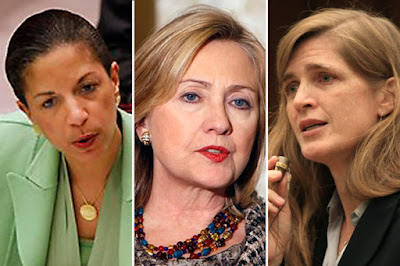 |
| Susan Rice, Hillary Clinton and Samantha Power: Pushed For War For Regime Change in Libya in 2011 |
Yet despite the African Union’s March 11, 2011 rejection of external foreign overt military intervention in regard to the Libyan civil war, after Libyan troops loyal to the Qaddafi regime regained control of Brega on March 13, 2011 and regained control of Ajdabiya on March 16, 2011, the Democratic Obama-Biden-Clinton administration and its NATO allies began to overtly intervene militarily in Libya; and to overtly launch a 2011 war for regime change in Libya in the following way, according to the Sowing Chaos book:
“The UN Security Council passed Resolution 1973 on March 17 [2011], imposing a no fly zone upon Libya…Soon after, the American Odyssey Dawn operation commenced. Naval units in the Mediterranean launched hundreds of Tomahawk missiles…”
As the 2015 RAND Project Air Force study, titled Precision and Purpose (which Johns Hopkins University Adjunct Professor and RAND Arroyo Center Strategy, Doctrine and Resources Program Director Karl P. Mueller edited), also noted:
“By March 14 [2011], Qaddafi’s troops were bearing down on the rebel stronghold of Benghazi…On March 19 [2011]…the United States fired over 100 Tomahawk land-attack cruise missiles (TLAMs) at central nodes of Qaddafi’s air defense system along the Libyan coast…With Libya’s air defenses crippled, the coalition proceeded to fly multiple air strikes…including some B-2 bomber sorties launched from bases in the continental United States…The United States flew the vast majority of strike sorties…By midweek, the United States, added A-10 `Warhogs’ and AC-130 Spectre gunships to further enhance coalition capabilities against regime forces on the ground…
“…Operation Odyssey Dawn…was the code name for U.S. operations…Although the Defense Department named the U.S. intervention Operation Odyssey Dawn, Congress never endorsed the intervention…During Odyssey Dawn, the 603/617 Air Operation Center enabled more than 2,000 sorties and identified more than 1,400 targets…
“…The heaviest concentration of Tomahawk strikes took place near Tripoli and Misrata…U.S. Navy FA-18 G Growlers providing electronic warfare support, took place some 10 miles south of Benghazi…In the early hours of March 20 [2011], three B-2 Spirit bombers flying from Whiteman AFB targeted…near Sirte…The next day, Air Force F-15E strike Eagles…conducted strikes against fixed targets near Sirte…
“As many as 3,123 USAF personnel and 153 aircraft deployed to support Operation Odyssey Dawn; those aircraft flew…2,132 sorties. U.S. aircraft had employed 764 weapons and fired an additional 2,169 rounds of ammunition…On March 31 [2011], Odyssey Dawn drew to a close, and military operations in Libya continued under Operation Unified Protector…Of the 199 sea-launched cruise missiles fired in the first 10 days, 192 were American…”
 |
| Air Force Major General Who Planned 2011 Operation Odyssey Dawn Aerial Attack ON Libya |
At least four other women apparently also played significant historical roles in urging that U.S. Major General Margaret Woodward’s Operation Odyssey Dawn aerial attack on Libya plan be implemented in late March 2011. As the same 2015 RAND Project Air Force study, for example, recalled:
“In the weeks following the outbreak of fighting in Benghazi…Samantha Power, an aide on the national Security Council, and Susan Rice, U.S. Ambassador to the United Nations, were early and outspoken advocates of intervention within the U.S. government. Michele Flournoy, the Under Secretary of Defense for Policy, worked more quietly behind the scenes…They gained traction with Secretary of State Hillary Clinton during the second week of March [2011]…President Obama agreed to authorize action…On March 17 [2011], the President authorized intervention…The willingness of the President…to assist with the overthrow of Qaddafi was clear well before his March 18 [2011] speech…On March 28 [2011], Obama raised Qaddafi’s downfall to the level of public policy…Three senior Obama administration officials (National Security Council staff member Samantha Power, U.N. Ambassador Susan Rice, and Secretary of State Clinton) played important roles in convincing the President to go beyond the…approach…advocated by those reluctant to see America engaged in another war…”
 |
| Michelle Flournoy: Pushed For War For Regime Change In Libya In 2011 |
(end of part 1)





1 comment:
JUST GOES TO SHOW: WOMEN CAN BE WAR CRIMINALS TOO !
Post a Comment